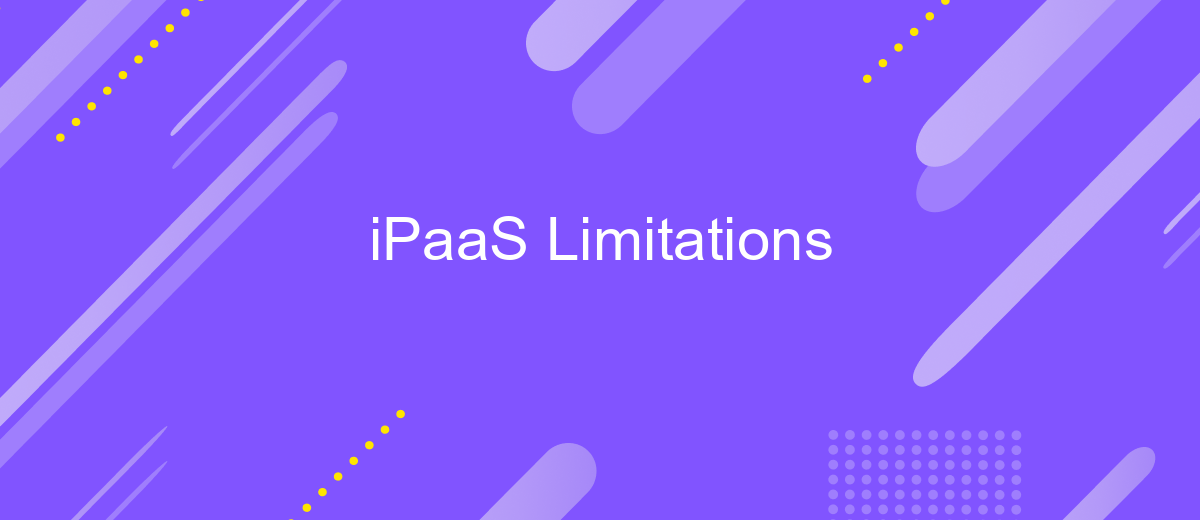iPaaS Limitations
Integration Platform as a Service (iPaaS) has revolutionized the way businesses manage and integrate their applications and data. However, despite its numerous advantages, iPaaS is not without its limitations. This article explores the key challenges and constraints associated with iPaaS, providing insights into areas where it may fall short and considerations for businesses contemplating its adoption.
Introduction
Integration Platform as a Service (iPaaS) has become a cornerstone for businesses seeking seamless connectivity between disparate systems. While iPaaS solutions like ApiX-Drive offer numerous advantages, such as simplified integration processes and enhanced automation, they are not without limitations.
- Complexity in handling large-scale data migrations
- Security concerns related to data transmission and storage
- Customization constraints for specific business needs
- Potential latency issues affecting real-time data processing
- Vendor lock-in risks and associated costs
Understanding these limitations is crucial for businesses to make informed decisions when adopting iPaaS solutions. By acknowledging and addressing these challenges, companies can better leverage platforms like ApiX-Drive to optimize their integration strategies and achieve more efficient workflows.
Common Limitations

One common limitation of iPaaS (Integration Platform as a Service) is the complexity involved in customizing integrations to fit specific business needs. While iPaaS solutions are designed to simplify the integration process, they often require a significant amount of technical expertise to configure and maintain. This can be a barrier for small to medium-sized businesses that may not have dedicated IT staff. For instance, services like ApiX-Drive offer a user-friendly interface for setting up integrations, but even these can become challenging when dealing with complex workflows or non-standard applications.
Another limitation is the issue of data security and compliance. Many iPaaS solutions store data in the cloud, which raises concerns about data privacy and regulatory compliance. Businesses must ensure that their chosen iPaaS provider complies with relevant regulations such as GDPR or HIPAA. Additionally, the reliance on third-party services can introduce vulnerabilities, making it crucial to thoroughly vet any iPaaS provider. Despite these limitations, iPaaS platforms like ApiX-Drive continue to evolve, offering more secure and customizable solutions to meet the growing demands of businesses.
Platform-Specific Limitations

While Integration Platform as a Service (iPaaS) offers many advantages, it also comes with platform-specific limitations that users must consider. These limitations can vary significantly depending on the iPaaS provider and the specific needs of the business.
- Customization Constraints: Some iPaaS platforms may not offer the level of customization required for complex integrations, limiting the ability to tailor solutions to specific business needs.
- Scalability Issues: Certain platforms may struggle with scalability, particularly when dealing with large volumes of data or high transaction throughput.
- Vendor Lock-in: Users may find it challenging to switch providers due to proprietary technologies and data formats, leading to potential vendor lock-in.
- Integration Capabilities: Not all iPaaS solutions support a wide range of applications and services, which can limit the ability to integrate with all necessary systems.
Services like ApiX-Drive help address some of these limitations by offering a wide array of integration options and user-friendly customization features. However, businesses should carefully evaluate their specific requirements and potential platform constraints before committing to an iPaaS solution.
Overcoming Limitations

Despite the limitations of iPaaS, there are several strategies to mitigate these challenges effectively. One of the primary approaches is to ensure a thorough understanding of the specific needs and requirements of your integration projects. This involves detailed planning and analysis to identify potential bottlenecks and areas that might require additional resources or custom solutions.
Another crucial step is to leverage specialized integration services such as ApiX-Drive. ApiX-Drive offers a wide array of pre-built connectors and customizable options that can simplify the integration process. By utilizing such services, businesses can streamline their workflows and reduce the complexity associated with manual integrations.
- Utilize pre-built connectors to save time and effort.
- Employ customizable options for unique integration needs.
- Conduct thorough planning and analysis to anticipate challenges.
- Invest in training and support to enhance team capabilities.
By adopting these strategies, organizations can overcome the inherent limitations of iPaaS and achieve more efficient and effective integration processes. Leveraging tools like ApiX-Drive can significantly enhance the scalability and flexibility of integration solutions, ensuring that they meet the evolving needs of the business.
Conclusion
In conclusion, while iPaaS solutions offer significant advantages in terms of streamlining and automating integrations, they are not without their limitations. Challenges such as data security concerns, integration complexity, and potential scalability issues need to be carefully considered when adopting iPaaS platforms. Additionally, the need for specialized knowledge to manage and maintain these systems can pose a barrier for some organizations.
To mitigate these challenges, businesses can leverage specialized integration services like ApiX-Drive, which simplifies the process of connecting various applications and automating workflows. By using such tools, organizations can overcome many of the inherent limitations of iPaaS, ensuring more efficient and secure integrations. Ultimately, understanding and addressing these limitations is crucial for maximizing the benefits of iPaaS solutions in any business environment.
FAQ
What are the common limitations of iPaaS solutions?
How does iPaaS handle data security?
Can iPaaS solutions integrate with all applications?
What happens if the internet connection is lost while using iPaaS?
Are there customization limitations with iPaaS solutions?
Time is the most valuable resource in today's business realities. By eliminating the routine from work processes, you will get more opportunities to implement the most daring plans and ideas. Choose – you can continue to waste time, money and nerves on inefficient solutions, or you can use ApiX-Drive, automating work processes and achieving results with minimal investment of money, effort and human resources.

